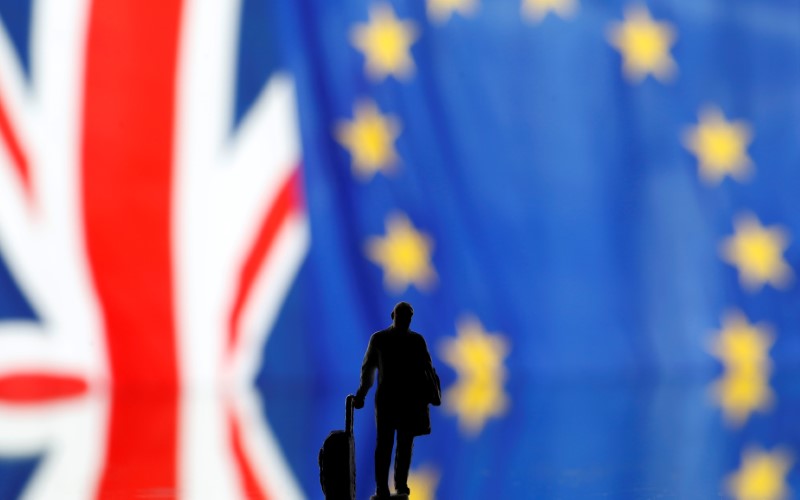By Jan Strupczewski and John Chalmers
BRUSSELS (Reuters) - Wrapping up even a "bare bones" deal on the future relationship between the European Union and Britain will be fraught with complexity and, with so little time to get it done, a painful "hard" Brexit on Dec. 31 cannot be ruled out, diplomats said.
A basic agreement would have to include a free trade pact, a deal on preserving a "level playing field" of rules and standards to guarantee fair competition, and a governance structure to expand the relationship later.
After Britain formally leaves the EU on Jan. 31, it enters a transition period until the end of 2020 during which it will remain an EU member in all but name while both sides try to hammer out a deal on their future relationship.
British Prime Minister Boris Johnson insists he will not seek an extension of the transition period. That leaves a tight deadline to avoid a potentially damaging "no-deal" outcome at the end of the year.
An agreement would have to be struck by the middle of October to leave time needed to translate the treaty into the EU's 23 official languages and the possible need for ratification in the bloc's parliaments before year-end.
A senior diplomat said he expects little progress in negotiations between the European Commission and Britain in the months ahead, and there will be just a few weeks left after the Brussels summer break to get a deal across the line.
"Usually in the EU things don't get moving until there is a real crisis," the diplomat said on Thursday.
Diplomats said an agreement would have to include deals on aviation, transport and fisheries, a politically thorny issue - and one where London could have the upper hand in negotiations because, after Brexit, fishing boats from EU countries will no longer be able to operate in British waters as they do now.
SWISS MODEL RULED OUT
They said other elements could be negotiated and added later because only a "bare bones" deal is possible in such a short time.
The EU does not want to replicate its arrangement with Switzerland, with which it has more than 100 bilateral agreements to cover various aspects of the relationship.
"The idea is to have one treaty by end-2020, which would also have a governance structure and an openness to add supplementary treaties," an EU diplomat involved in the talks said.
The EU is worried that once out of the bloc, Britain may try to undercut EU firms by lowering labour or environmental standards or by subsidising certain industries.
To prevent that, the EU wants a non-regression clause in the new relationship treaty and a joint committee with London that would consider realignments of British rules if EU standards change.
"The more aligned Britain's rules are with the EU's, the better access it will have to the EU's single market," an EU official said.
If Britain were to lower its labour, tax, state aid or environmental standards to gain a competitive advantage over EU firms, the EU could revoke its easy access to its market by imposing tariffs, the diplomats said.
If the future relationship treaty only deals with purely EU competencies like trade or fisheries, it could be ratified by the European Parliament only, making the process faster and simpler.

But if it includes agreements on aviation, security, transport of mobility of citizens - areas of competence of EU member state governments - national parliaments would have to have a say, increasing the risk of delays and a "no deal".
(Aditional reporting by Gabriela Baczynska; Editing by Mark Heinrich)